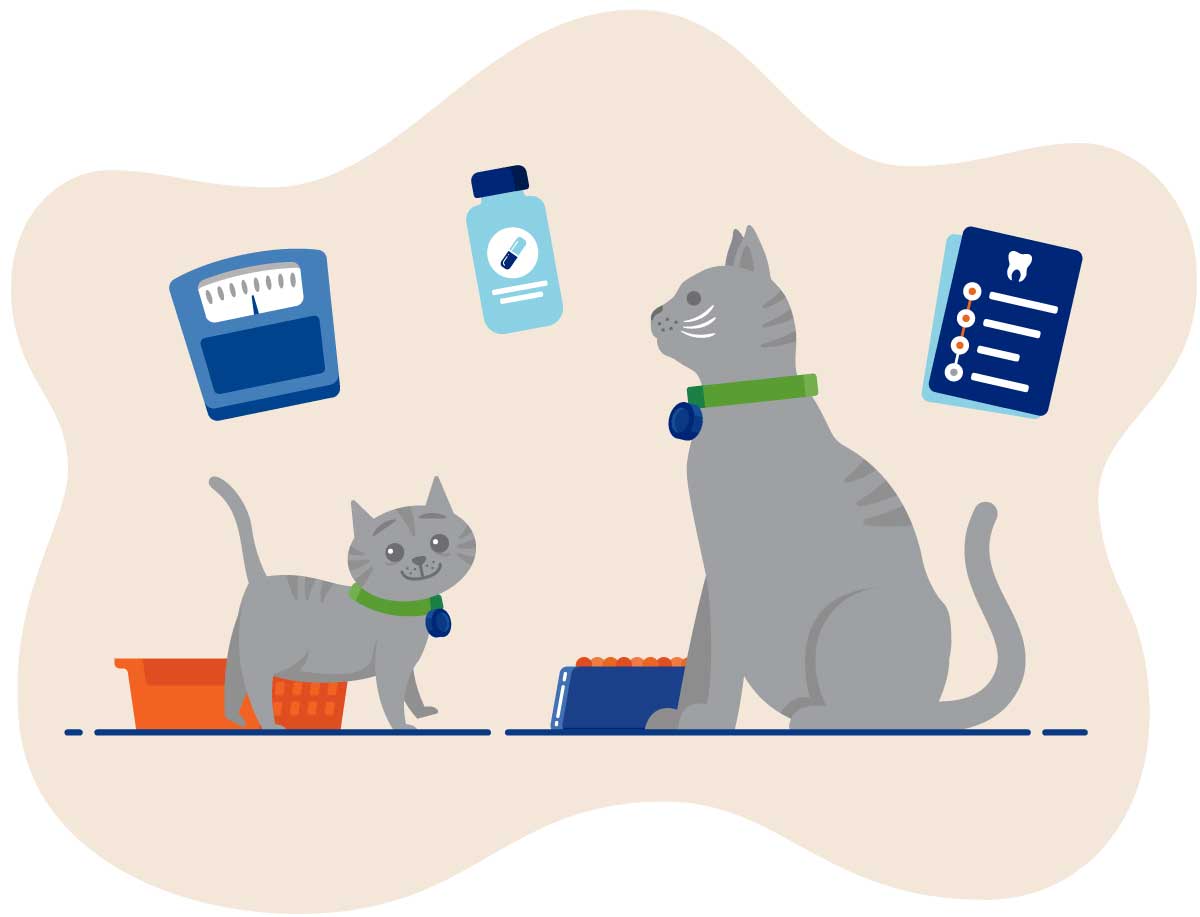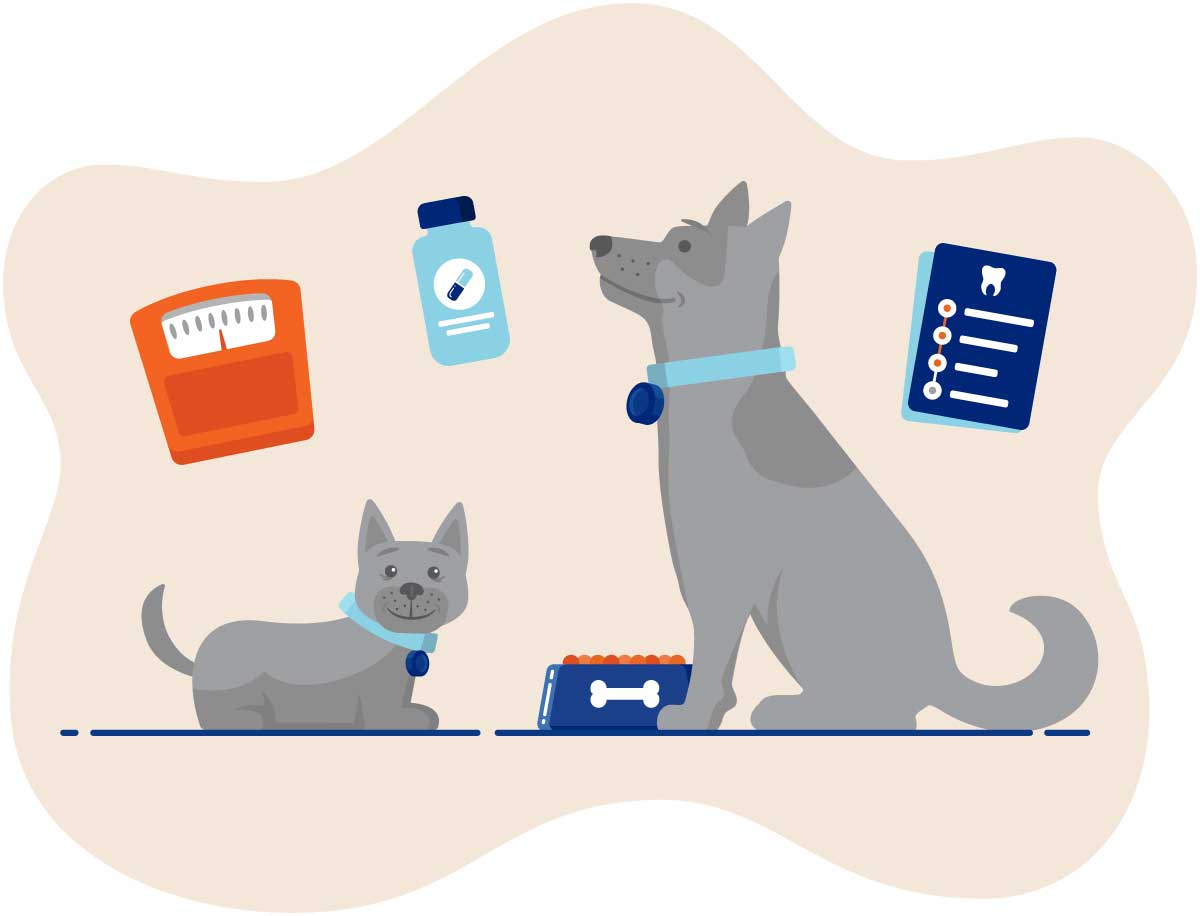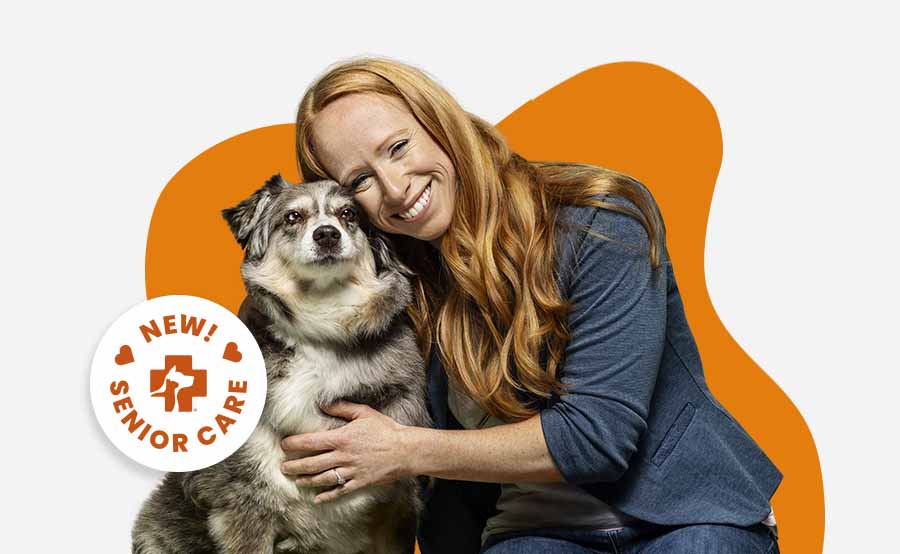dog and cat life stages
Is your furry friend a kitten or puppy? Young adult? Mature adult? Possibly a senior?
Knowing your pet's life stage helps spot health risks early and provides age-specific care to keep them healthy.
Conozca los Optimum Wellness Plans® para mascotas de edad avanzada

Stages of a cat's life
- Kitten (birth to 1 year)
- Young adult (1 to 6 years)
- Mature adult (6 to 10 years)
- Senior (older than 10 years)

Stages of a dog's life
Please note that there’s variation in these ages based on breed.
- Puppy (birth to 1 year)
- Young adult (1 to 4 years)
- Mature adult (4 to 8 years)
- Senior (older than 8 years)
Why a pet's life stage matters
Life stages are how we break down the aging and maturation process. They provide a framework of how best to care for your furry friend, and they can help both you and your vet when it comes to expectations, vaccinations, comprehensive exams, diagnostic testing, treatments, and more.
Stages of a cat’s life are rather straightforward, while dog life stages are dependent on breed/size. Life stages can also be affected by your pet’s lifestyle and health.

Why senior petcare needs special attention
Senior pets become more vulnerable to age-related conditions that require extra care and monitoring. Arthritis can make movement painful, while cognitive decline — including signs of dog dementia or cat dementia — can affect their behavior, memory, and routine. Kidney disease is also common in older cats and dogs and often goes unnoticed until it's advanced. Regular vet visits and paying attention to changes in behavior or mobility can make a big difference in keeping senior pets comfortable and healthy for as long as possible.
What are the stages of a cat’s life?
Cat life stages include kitten (up to 1 year old), young adult (from 1 to 6 years old), mature adult (from 6 to 10 years old), and senior cat (older than 10 years old).
For each life stage, there are 10 health-related factors.
Behavior and environmental needs
Your vet will evaluate any potential cognitive changes that could contribute to new and/or unwanted behaviors.
Urination and defecation
Your cat’s current litter box habits will be evaluated by your vet to determine whether any testing is needed. They’ll also advise if any adjustments should be made to their nutrition or litter box size and/or placement.
Nutrición
Your vet will discuss healthy eating habits and stress the importance of maintaining a healthy weight.
Salud bucodental
Your pet’s oral health will be examined, including any risk of periodontal disease, and your vet will discuss at-home care along with potential anesthetic procedures for support.
Control de parásitos
The importance of continued year-round parasite control will be addressed based on your pet’s lifestyle.
Vacunas
Your pet's lifestyle and needs will be assessed to determine the appropriate vaccinations.
Zoonotic disease and human safety risk
Your vet will discuss the risk of illness or danger to humans and how to minimize it.
Reproducción
Your pet’s reproductive health and/or associated anatomy will be evaluated.
Breed-specific conditions
Your vet will inform you of any risk for inherited diseases and recommend a screening plan.
Recommended diagnostics
A series of tests may be recommended based on your pet's overall health and medical history.

What are the life stages of a dog?
Dog breeds and sizes vary way more than cat breeds, so their life stages aren’t as clear-cut. Most dogs are puppies from birth to 1 year, young adults from 1 to 4 years, mature adults from 4 to 8 years, and seniors after age 8.
Smaller breed dogs tend to live longer and may reach seniorhood a little later around age 10. Large and giant breeds take longer to grow and are considered puppies from birth to 1.5 or 2 years. Since they have a shorter lifespan, they tend to reach seniorhood earlier around age 6. If you’re curious about your furry friend’s stage of life, ask at their next vet appointment!
For each life stage, there are 10 health-related factors.
Lifestyle effect on the patient’s safety
Your vet will consider your dog’s mobility, sight, and hearing and make any environmental adaptation recommendations.
Zoonotic disease and human safety risk
Risk of illness or danger to humans will be discussed by your vet with recommendations on how to minimize it.
Comportamiento
Any potential cognitive changes that could contribute to new and/or unwanted behaviors will be evaluated.
Nutrición
Your vet will discuss healthy eating habits and stress the importance of maintaining a healthy weight.
Control de parásitos
The importance of continued year-round parasite control will be addressed based on your pet’s lifestyle.
Vacunas
Your vet will assess your pet's lifestyle and needs to determine the appropriate vaccinations.
Salud bucodental
Your pet’s oral health will be examined, including any risk of periodontal disease, and your vet will discuss at-home care along with potential anesthetic procedures for support.
Reproducción
Your pet’s reproductive health and/or associated anatomy will be evaluated.
Breed-specific conditions
Your vet will inform you of any risk for inherited diseases and recommend a screening plan.
Recommended diagnostics
A series of tests will be recommended based on your pet's overall health and medical history.

How do I know if my dog or cat is nearing end of life?
The American Animal Hospital Association recognizes an end-of-life stage for dogs and cats that can occur at any point throughout the other stages. This can be due to injury or illness and can involve a period of palliative care. For signs to look out for and more info, check out our articles on end-of-life care.
Life stages are just guidelines
It’s important to remember that life stages aren’t everything. They’re simply used as guidelines for expectations and care. A super healthy 11-year-old cat may be treated more like a “mature adult” than a “senior.” Ultimately, you and your vet know your pet best and will be able to make the most informed call for care and any potential treatment.
Revisado médicamente por los MVZ Ari Zabell y Heidi Cooley.
Atención personalizada que crece al ritmo de su mascota
Puede ahorrar más de un 30% al agrupar el cuidado preventivo de su mascota con un Optimum Wellness Plan. Además de exámenes integrales, vacunas y pruebas de diagnóstico, estos prácticos paquetes también incluyen visitas ilimitadas al consultorio, Pet Chat™ 24/7, descuentos en la mayoría de los productos de Banfield y más.
Nuestro NUEVO Senior Care Optimum Wellness Plan incluye las pruebas diagnósticas más exhaustivas a la fecha. Esto nos ayuda a detectar cambios en la función de los órganos y la salud física general, para que podamos comenzar cualquier tratamiento recomendado lo antes posible.

Senior Care
Diseñado para ayudar a detectar signos tempranos de enfermedades relacionadas con la edad.
Este plan combina servicios esenciales, como vacunas y exámenes, con pruebas diagnósticas exhaustivas.
Vea qué incluye Senior CareSenior Care Plus
Diseñado para ayudar a detectar signos tempranos de enfermedades relacionadas con la edad y brindar apoyo para cualquier necesidad dental adicional.
Este plan incluye todos los servicios de nuestro plan Senior Care más una limpieza dental.
Vea qué incluye Senior Care Plus

 Ácaros y sarna
Ácaros y sarna Pódcast: Not Just Fluff
Pódcast: Not Just Fluff






